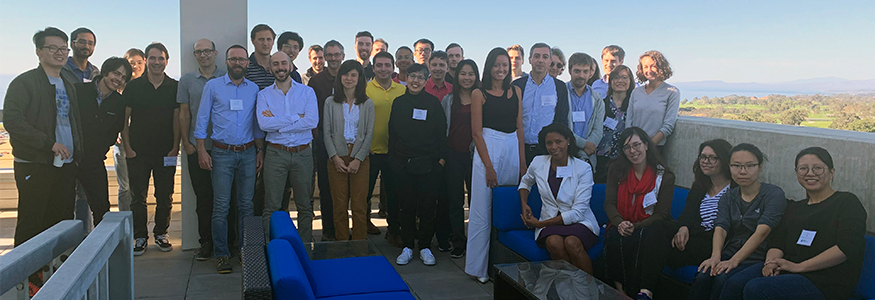
Conference on Rational Inattention and Political Economy
Nov. 9, 2019
Location: UC San Diego’s Villages 15 A and B
Overview
The first conference on Rational Inattention and Political Economy was a small, high-quality research conference intended to push forward the research agenda on limited-attention politics.
Papers
“News Absorption and Voters’ Information”
Charles Angelucci, Columbia University (Co-Author: Andrea Prat)
“The Politics of News Personalization”
Anqi Li, Washington University in St. Louis (Co-Authors: Lin Hu and Ilya Segal)
“How Campaign Ads Stimulate Political Interest”
Gregory J. Martin, Stanford University (Co-Author: Nathan Canen)
“Electoral Competition with Rationally Inattentive Voters”
Filip Matejka, CERGE-EI (Co-Author: Guido Tabellini)
“A Model of Focusing in Political Choice”
Salvatore Nunnari, Bocconi University (Co-Author: Jan Zapal)
“Opportunistic Authoritarians, Reference-Dependent Preferences and Democratic Backsliding”
Carlo Prato, Columbia University (Co-Author: Edoardo Grillo)
“Social Learning and Institutional Enforcement with Unethical Agents”
Bruno Strulovici, Northwestern University
“Media Competition and Social Disagreement”
Sevgi Yuksel, UC Santa Barbara (Co-Author: Jacopo Perego)
“Optimal Dynamic Information Acquisition”
Weijie Zhong, Cowles Foundation
Conference Agenda
Location: UC San Diego’s Villages 15 A and B
8:15 a.m. – Registration and Breakfast
9 a.m. – “Optimal Dynamic Information Acquisition,” Weijie Zhong, Cowles Foundation
9:45 a.m. – “Electoral Competition with Rationally Inattentive Voters,” Filip Matejka, CERGE-EI (Co-Author: Guido Tabellini)
10:30 a.m. – Coffee Break
10:50 a.m. – “The Politics of News Personalization,” Anqi Li, Washington University in St. Louis (Co-Authors: Lin Hu and Ilya Segal)
11:35 a.m. – “Media Competition and Social Disagreement,” Sevgi Yuksel, UC Santa Barbara (Co-Author: Jacopo Perego)
12:20 p.m. – Lunch
1:30 p.m. – “News Absorption and Voters’ Information”, Charles Angelucci, Columbia University (Co-Author: Andrea Prat)
2:15 p.m. – “A Model of Focusing in Political Choice,” Salvatore Nunnari, Bocconi University (Co-Author: Jan Zapal)
3 p.m. – “How Campaign Ads Stimulate Political Interest,” Gregory J. Martin, Stanford University (Co-Author: Nathan Canen)
3:45 p.m. – Coffee Break
4:05 p.m. – “Opportunistic Authoritarians, Reference-Dependent Preferences and Democratic Backsliding,” Carlo Prato, Columbia University (Co-Author: Edoardo Grillo)
4:50 p.m. – “Social Learning and Institutional Enforcement with Unethical Agents”, Bruno Strulovici, Northwestern University
6:30 p.m. – Dinner at the Grande Colonial Hotel, La Jolla (a shuttle is scheduled to pick guests up from the Villages to the restaurant at 5:45 p.m. and from the restaurant back to Estancia at 9 p.m.).
Conference Description
Recently, limited attention has been increasingly recognized as an important source of friction in political decision-making. Ordinary citizens, bombarded by digital distractions, allocate attention as scarce resources to the political realities they care most about. Self-interested politician and media act accordingly, putting attention and eyeballs on top of their priority lists. As of today, the role of limited attention in shaping political outcomes awaits formalization and full exploration, and many fundamental questions remain unanswered. For example, how do we model political decision-making under attention constraints? What is its equilibrium effect on political outcomes? Can we explain the recent political landscape through the channel of limited attention? And what institutions and interventions can ameliorate their distortions?
The conference will bring together scholars from three research areas: economic theory, political economy and media studies, and it hopes to accomplish two goals. The first goal is to familiarize researchers from diverse backgrounds with recent developments in rational inattention (RI). RI is a burgeoning eld that studies rational decision-making under attention constraints. Its role in single-agent decision problems has been extensively studied, and the recent trend is to understand its impact for strategic interactions. Part of the conference will be devoted to exploring the usefulness of RI as a tool for analyzing limited-attention politics. To this end, papers on the theoretical frontier will be presented and discussed.
The second goal is brainstorming and agenda setting. As of today, little is known about the roles of RI in altering the demand for political news, creating echo chambers and later bubbles and facilitating the spread of falsehoods. Its equilibrium effect on self-interested politicians and media outlets remains understudied. Its impact on polarization and, more broadly, politics awaits evaluations. Attempts to tackle these big-picture questions will be presented and discussed. The hope is to develop interdisciplinary conversations and to identify the most pertinent research questions using the wisdom of the crowds.
Program Committee
The program committee consists of:
- Renee Bowen, UC San Diego
- Simone Galperti, UC San Diego
- Lin Hu, Australian National University
- Federica Izzo, UC San Diego
- Anqi Li, Washington University in St. Louis
- Joel Watson, UC San Diego
